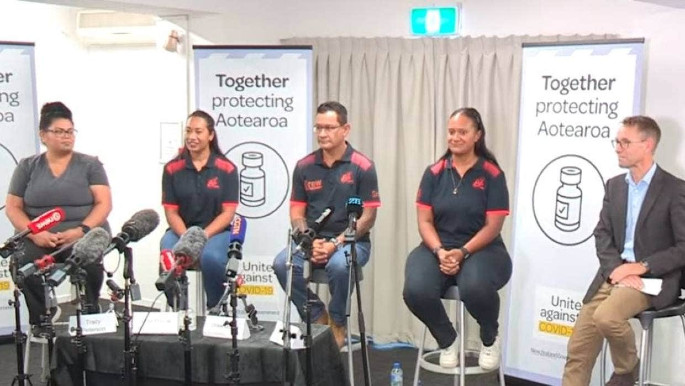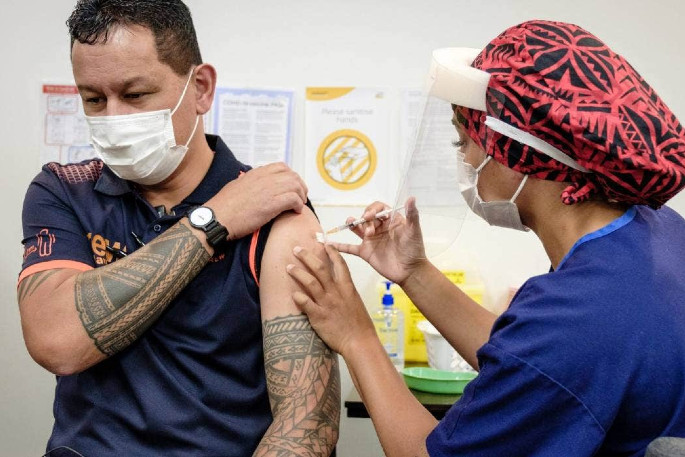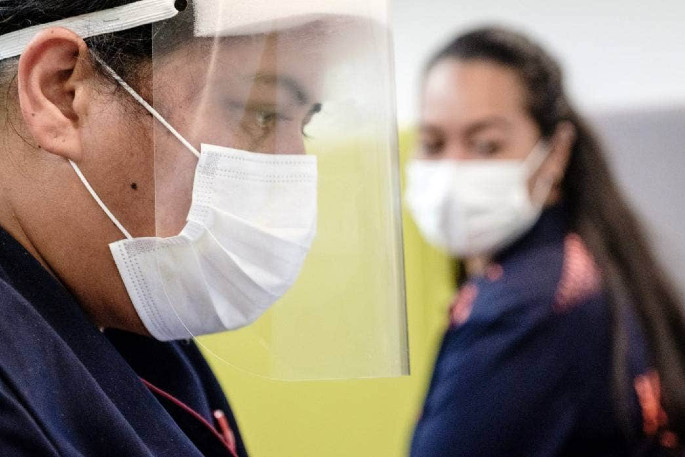The first of the country's 12,000-strong border workforce have received the Covid-19 vaccine.
Workers at Auckland's Jet Park Hotel received the Pfizer/BioNTech Covid-19 jab on Saturday, in the first stage of New Zealand's vaccine campaign.
The border workforce will be inoculated over three weeks. Enough doses to vaccinate 30,000 people landed via airfreight from Belgium in Auckland on Monday morning.

Next to Director-General of Health Dr Ashley Bloomfield is Lynette Faiva, who works in the Jet Park Hotel family team, then to her left Jet Park operations manager Drew Leafa. Second from left is Jet Park team member Lorna Masoe, and on the outside left is vaccinator Tracy Peterson. Lynette Faiva was the first MIQ worker to be vaccinated, Drew Leafa was second, and Lorna Masoe was third. Photo: Ministry of Health.
Lynette Faiva, the first managed isolation and quarantine worker in New Zealand to get a Covid-19 vaccine says she felt "pretty privileged and honoured".
"But for me it's not about being first, it's all about having this opportunity to be able to get vaccinated," says Lynette Faiva.
"We were in it together. We all got done at the same time," she told reporters at a Ministry of Health briefing on Saturday.
Lynette works in the Jet Park Hotel family team. She is responsible for providing support to families while in managed quarantine. Lynette organises games, educational activities and welfare support for families.

Drew Faiva is vaccinated in Auckland on Saturday. Photo: Ministry of Health
Drew Leafa has worked at Jet Park since it became a managed quarantine facility in early 2020. Drew is the Operations Manager at Jet Park and is responsible for the day to day management of operations on site. Prior to working at Jet Park he worked at a law firm and was looking for a career change. He has enjoyed working at Jet Park over the last year and feels it is a privilege to be involved in such an important part of keeping New Zealand safe.
Lorna Masoe has worked at Jet Park for 12 years and currently works in the Reservations/Admin team. She is a fundamental part of the team and works across a large variety of areas. Lorna is involved in organising operational, wellbeing and health requirements for returnees, including the scheduling of all COVID-19 swab tests at Jet Park which is a very large responsibility.
Tracy Peterson, a registered nurse and one of our vaccinators, was also present.
This live stream is in two parts:
Director-General of Health Dr Ashley Bloomfield says New Zealand has arrived at a key point in its pandemic response, with yesterday's first vaccinations of border workers.
'Today's vaccinations reinforce the value of what we've all been doing for the past 12 months to keep COVID-19 at bay,” says Dr Bloomfield.
'Vaccination of our hard working and dedicated border staff marks a significant step forward – a milestone that protects those at highest risk of getting the virus and helps to reduce the risk of it spreading into the community.
'Yesterday, 29 vaccinators here in Auckland completed a week of preparations, by receiving the first COVID-19 vaccines.
'Today, we kick off the largest immunisation programme in our history, by vaccinating the first of our border workforce, a critical step in protecting everyone in Aotearoa," says Dr Bloomfield.
'This is an important first step and we will be moving through these first few days and weeks in a measured way to make sure our systems and processes are solid."
'On Monday, we'll roll out the programme in Wellington and then Christchurch on Wednesday, before starting to vaccinate the rest of New Zealand's about 12,000 border and MIQ workers over the next few weeks.
'Once they've been vaccinated, we'll start vaccinating the members of their household contacts.
"The finer details of the wider public roll out later in the year are being finalised and information on when and how people can get their vaccinations will be announced soon.
'People from across the health system and many other agencies have been and continue to be single-minded in ensuring that the vaccination programme will be a sustained success.
'In a rapidly changing environment, our system has had to be flexible in its response to delivering firstly on our elimination strategy and now on the vaccination programme.
'I sincerely thank everyone who has contributed," says Dr Bloomfield.
'I particularly want to acknowledge the support of the New Zealand Defence Force, the Ministry of Business, Innovation and Employment and the teams at their managed isolation facilities, the All of Government team, a range of private sector partners, our DHBs and the wider health system including the public health teams, our Māori and Pacific providers, the nurses, the doctors, the allied health professionals, administrators, ICT professionals, planners, communications advisors and leaders.
'It's been a huge logistical effort getting to where we are today. And it's been done while our health system has continued to deliver a wide range of care to New Zealanders and maintained a successful response to the global COVID-19 pandemic.
'Repeated trial runs of our processes and systems meant we have been able to deliver these first vaccinations less than a week after the first batch of Pfizer/BioNTech arrived in New Zealand.
'We should all be proud that in less than a year from our first confirmed case, we are ready to go with what I consider to be the biggest single logistical exercise our health system has ever tackled.
'Today represents a small but important step in a long journey. It's the start of a new chapter but we still have a long way to go in the COVID-19 story. We need to remember that this pandemic is the most significant global public health challenge in a century and managing it will require all our efforts for some time to come," says Dr Bloomfield.
'So, even though vaccinations have begun, it's important everyone stays vigilant and sticks to the basics: staying home if unwell and getting advice about having a test, washing hands, coughing and sneezing into the elbow, and wearing masks or face coverings on all public transport.
'And please also keep up the good work and use the COVID Tracer app to keep track of where you've been, scan QR codes wherever you go and turn on Bluetooth tracing in the app dashboard.
'If the research, good science and technology behind these vaccines seems highly sophisticated -- it is. We can have confidence in both the science and the processes that New Zealand has in place to ensure any vaccines we use are safe and effective," says Dr Bloomfield.
"But in the end, our success with this campaign will be achieved in the same way we have achieved success with our response – by acting collectively and in each others' interests."
Two new cases of Covid-19 in managed isolation were reported on Saturday. There were no further cases in the community.
The two new cases arrived within the same travel bubble in Auckland on February 18, from the United Arab Emirates.
Other than the seven community cases previously reported, all close contacts associated with the current cases' households, school, and New Plymouth travel group, have tested negative for the virus.
Contact tracing has revealed 128 close contacts associated with all cases in the cluster, with 120 returning negative tests.
The eight people whose test results are pending include seven people who were at the medical centre visited by a person with coronavirus, and the workplace contact of another.
Global toll
The global case count has risen to over 110.9 million, according to Johns Hopkins University.
The US has had the most reported cases - 28m - followed by India and Brazil with 10.9m and 10m cases respectively.
To date, 2.4m people have died from the virus, with the majority in the US, Brazil and Mexico.
What should I do?
Anyone who wants to get tested can find their local testing centres by visiting the Ministry of Health website.
Auckland is at Covid-19 alert level 2, while the rest of New Zealand is at alert level 1.
If you are sick, call your GP before you visit, or Healthline on 0800 358 5453
To avoid contracting and spreading the virus, wash your hands properly, cough and sneeze into the crook of your elbow and throw tissues away immediately.
Reach out, find support from people who care, connect with your community or help a neighbour in need.



0 comments
Leave a Comment
You must be logged in to make a comment.